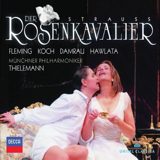|
|
|
|
|
|
|
|
| Opera News, December 2012 |
| DAVID J. BAKER |
|
|
R. STRAUSS: Der Rosenkavalier (CD)
|
|
 It's
easy to forget that this finely coordinated Rosenkavalier was recorded at a
live performance. Whether as a result of German etiquette or German
engineering, the audience at Baden-Baden on this occasion in January 2009 is
mute. The floorboards make not a whimper; voices and instruments emerge with
warmth and clarity. And the moments of quiet lyricism that most distinguish
the performance, especially in the Marschallin's pivotal scenes late in Act
I, achieve a rare degree of intimacy and directness. It's
easy to forget that this finely coordinated Rosenkavalier was recorded at a
live performance. Whether as a result of German etiquette or German
engineering, the audience at Baden-Baden on this occasion in January 2009 is
mute. The floorboards make not a whimper; voices and instruments emerge with
warmth and clarity. And the moments of quiet lyricism that most distinguish
the performance, especially in the Marschallin's pivotal scenes late in Act
I, achieve a rare degree of intimacy and directness.
Christian
Thielemann, a supportive conductor with singers (nowhere more so than in the
tenor monologue in his Vienna Tristan a few years ago), helps to make this a
great occasion for Renée Fleming in one of her best roles. The conductor
ideally cushions her slow, poised unfolding of the Marschallin's
introspective lines, keeping the instrumental texture feather-light. The
effect is like witnessing an inspired accompanist in a seasoned lieder
partnership.
Fleming has always relished details, and in this case
they feel natural, motivated, part of the fabric. The monologue's final
line, about bearing our inevitable fate as mortals — "und in dem 'Wie' da
liegt der ganze Unterschied" (and the how is what makes all the difference)
— becomes a resonant thumbnail portrait of the Marschallin; we hear both the
pain and the forbearance, her depth and her charm. The word "wie" glows
warmly and is echoed in the inflection of the same vowel in "Unterschied";
but the lightness of the phrasing is what really counts.
At soft
volume, Fleming skillfully brightens her rough lower register to maintain
the wistful mood. Elsewhere, too, the quieter moments have true Straussian
elegance — in her G on the word "Rose" and especially her radiance
throughout most of the final trio. Full-voice attacks can be a little raw,
but in the expressions of anger at Ochs in Act III they have dramatic
relevance. Early in the opera, both Fleming and the Baron Ochs, Franz
Hawlata, lack the ideal power for the fast, hectic dialogue, but they
compensate with rhythmic agility, vocal characterization and — not only in
his case — comic details such as Viennese dialect.
Diana Damrau's
dynamic Sophie is memorable for her glistening high notes and graceful
phrasing, an ideal rendition of youthfulness and rapture. She risks
harshness in voicing the young woman's arriviste pretensions early in Act
II, but her disappointment just before the happy end is also vividly
portrayed, helping to maintain dramatic tension. Sophie Koch's mezzo is not
quite robust enough for the role of Octavian, in which the singer must
provide dark counterpart to the sopranos and sometimes compete in the
soprano range. But this artistic singer clearly grasps the character's
exuberance and warmth.
Whether he is deliberately pampering a
light-voiced cast or sees this as a fundamentally pastel, nostalgic work,
Thielemann's tempo choices produce one of the slowest, longest versions of
Der Rosenkavalier on disc, even among live recordings. While it makes all
the traditional cuts in Ochs's scenes, this performance still runs longer
than the uncut versions by Erich Kleiber and Georg Solti. The result is not
leaden, although it is surprising in a conductor known for dynamism.
The approach suits the Marschallin's scenes as well as the Italian
Tenor solo, a fine, deliberately paced legato performance by rich-toned
Jonas Kaufmann, who is almost too smooth to mark the sixteenth-note runs as
more than a portamento. Other slow-motion scenes are less effective.
One occurs in the opening dialogue between the lovers, which at
least gives Koch's Octavian a chance for some expansive phrases; more
serious is the halting "presentation of the rose" scene, which loses some of
its magic at the eyedropper pace. Some comic touches, such as the Annina and
Valzacchi ensembles, would gain from acceleration, as proven in Carlos
Kleiber's live video versions.
One detail confirms the lyrical bias.
There is almost a transformation of the oafish Baron Ochs in his final
realization ("Mit dieser Stund' vorbei" — from this moment, it's all over),
where the pace comes to a crawl and Hawlata's Baron accepts his losses, not
as the score suggests in outrage, but in an uncharacteristic phrase of
refined mezza voce in a tenorial head tone.
Ochs's boisterous exit
music restores excitement, with infectious rhythms and some especially fine
flourishes from the Munich Philharmonic horns; generally, Act III is
livelier than the others. But that gossamer "Mit dieser Stund' vorbei"
lingers in the memory. It wins sympathy for the comic villain, yes, but it
also makes him sound not just foiled but emasculated — perhaps even
enlightened. Here, Baron Ochs has, in effect, his own Marschallin moment.
|
|
|
|
|
|
|
|
|
|
|